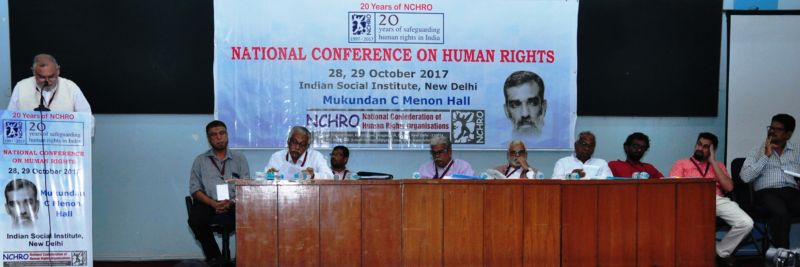New Delhi (Pervez Bari): The two-day National Conference on Human Rights organized by National Confederation of Human Rights Organizations (NCHRO) was inaugurated by Dr. Zafarul Islam Khan, Chairperson of Delhi Minorities Commission on Saturday last (28thOctober) in the Mukundan C Menon Hall at Indian Social Institute here.
“The government is not going by under the constitution. Police stations are not working under the constitution. The country is like under East India Company rule. There are many instances where we see the government is trying to undermine freedom and liberty of the people. Different kinds of laws like DIR, MISA, NSA, AFSPA, TADA, POTA, and UAPA are being used to threaten the civilians. How to start collective resistance for against violation of fundamental rights is a very big challenge. We have to educate people to fight for human rights in our country”, Dr. Zafarul Islam Khan said in his inaugural address.
Prof. P. Koya, General Secretary, NCHRO, while welcoming the gathering said: “The CHRO was established as an umbrella body of various human rights and civil rights organizations and activists in May 1997 at Calicut in a largely attended national conference on human rights organized by erstwhile National Development Front, Kerala. The founders wanted to take human rights activities to the people rather than holding sponsored seminars and indoor meetings as a weekend pastime of jurists, retired officials and their ilk. The common people have been the focus for they were mainly the victims of rights violations due to high handedness of the authorities especially the police”.
Prof. Koya said the first chairman of CHRO was K. Panur, a veteran activist, who first highlighted the plight of Adivasis in Wayanad District of Kerala. Mukundan C. Menon, the renowned journalist, became the first general secretary. In earlier days the confederation restricted its activities to Kerala. The necessity of strengthening human rights defenders and the need for a better coordination of the ongoing efforts in various parts of the country was discussed in various meetings held at New Delhi, Bangalore, Calicut and Trivandrum and it was decided to make the confederation a pan-Indian movement. In a meeting held in Mumbai on 26th June 2007 CHRO became national. Justice Hospet Suresh, the former justice of Mumbai High Court, was the Chairperson Adv. K.P. Mohammad Shareef, the General Secretary”, he stated.
Prof. A. Marx, chairperson of the NCHRO presided over the inaugural session. He said: “We see the British rule now in the BJP regime violating of rights in our country. Our constitution guarantees fundamental rights to every citizen of the country. We have to fight against violation of rights in any form and will have to change the current political scenario. There is an unholy alliance between the current government and corporate monopolies in the country which makes our fight arduous”.
E. Abubacker, Chairman, Popular Front of India, congratulated the organizers and offered his organization’s help and cooperation for the activities of the confederation. Eminent journalist and the editor of Dalit Voice V.T. Rajashekar pointed out that the Brahminical Social Order is a great threat to the country and is to be resisted tooth and nail.
Adv. A. Mohammed Yusuff, Secretary, NCHRO, briefed about the seminar series, which have been conducted in connection with the conference for the past three months in the important cities viz., Bangalore, Hyderabad, Bhopal, Chennai, Mumbai, Pondicherry, Calicut, Kolkata, Gauwhati and Kota on different topics.
Meanwhile, Journalist Pervez Bari presenting a paper on “Extra Judicial Killings and the Judicial response” said the ruling class does not seem to realise that the further the government goes down this road of such fake encounters and killings the more will India become a country that is not only without law, but one that flaunts its disregard for the very concept of law. When this realisation sinks in abroad, India will become not only an economic but also a political pariah. This must not happen. The first requirement for containing and repairing the damage that has already been done is for all political parties to admit their culpability and jointly resolve never again to allow anyone in police custody to be killed, or punished in any other way, than through the due process of the law, he cautioned.
The topics which were discussed in the conference included: Global Conflicts & Return of Cold War, UAPA – An Instrument Of Political Suppression; Nationality Question; Extra Judicial Killings And The Judicial Response; AFSPA & Other Security Laws: What They Really Serve?; Adivasis & Fight For Living Space; Rights of Refugees And Stateless People and Curtailing Freedom Of Expression.
Prof. G. Haragopal, Visiting Professor, NLSIU; Adv. K.P. Mohammed Shareef, Vice Chairperson, NCHRO; Reny Ayline, Secretary, NCHRO; Adv. Bavani. Ba. Mohan, State President, NCHRO, Tamil Nadu; Ahmed Shareef, Associate Editor, Thejas Daily, Calicut; Gopal Menon, Documentary Film Maker; E.M. Abdurrahman, People’s Movement Against UAPA; K.K. Suhail, Quill Foundation; Prof. Hany Babu, Associate Professor, Delhi University; Vidya Bhusan Rawat, Human Rights Activist; Pervez Bari, Journalist, Bhopal; Narendra Mohanthi, Treasurer, NCHRO; Parveena Ahangar, Association of Parents of Disappeared Persons, Kashmir; Elyas Muhammad Thumbe, Committee Member, Alliance for Justice and Peace; Dr. Shams-ul-Islam, Executive Member, NCHRO; Ms Zamrooda Habib, Writer & Activist, Kashmir; Ravi Nair, South Asian Human Rights Documentation Centre (SAHRDC); Ms Madhuri Krishnaswami, Activist, Bhopal; Adv. A. Mohammed Yusuff, Secretary, NCHRO; Mohammed Janib, Coordinator, NCHRO; R.K. Ankhodia (Rtd. Judge), State President, NCHRO, Rajasthan; Ko. Sugumaran, National Executive Member, NCHRO; Adv. Saifan Shaikh, National Executive Member, NCHRO; Fr. Savio Fernandez, State president, NCHRO, Goa presented papers on various topics.
The activists from 18 states viz., Kerala, Tamil Nadu, Pondicherry, Karnataka, Andhra Pradesh, Telangana, Maharashtra, Goa, Madhya Pradesh, Rajasthan, Haryana, Delhi, Jammu & Kashmir, Uttar Pradesh, Bihar, Odisha, West Bengal and Assam participated in the conference.
The cultural programmes of Nishanth Natya Manch led by Neelima Sharma and Sangwari Theatre Group led by Kapil Sharma and Delhi Street Theatre Group added spice to the academic discussions.

